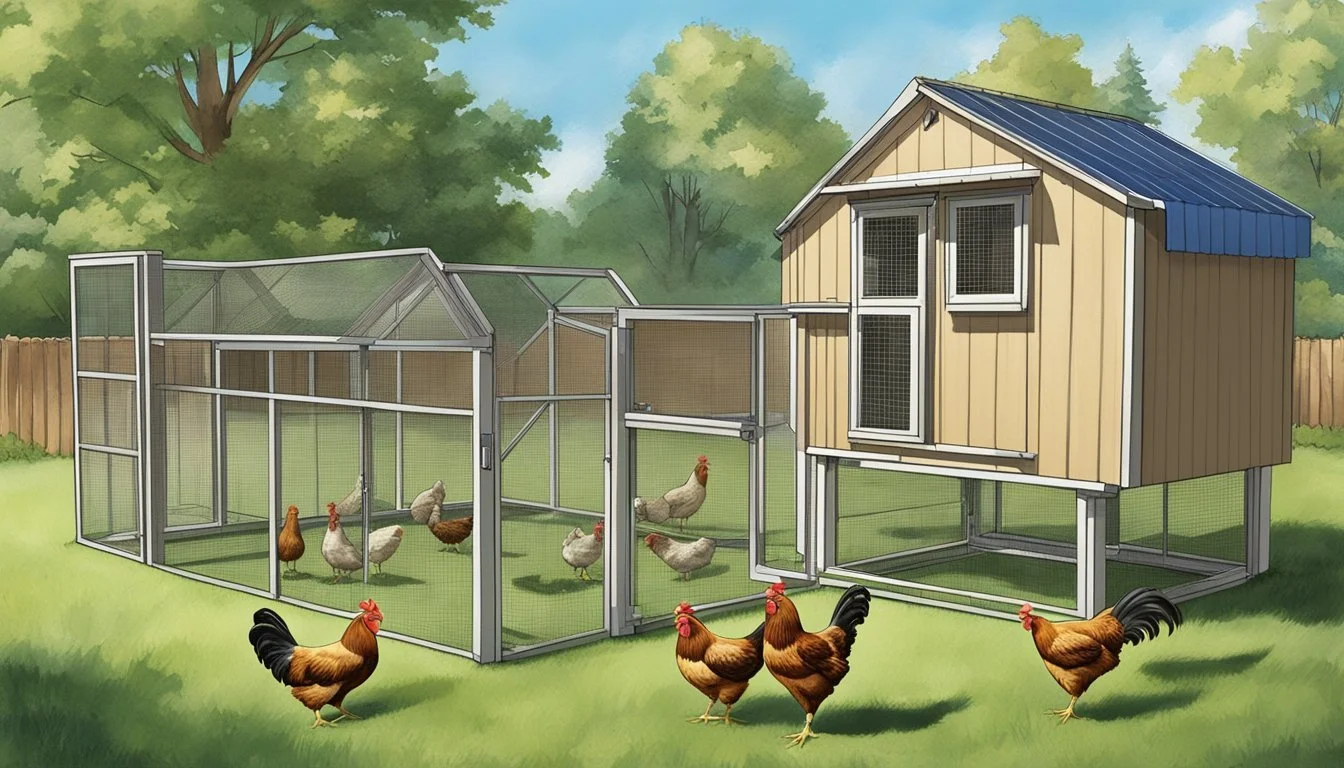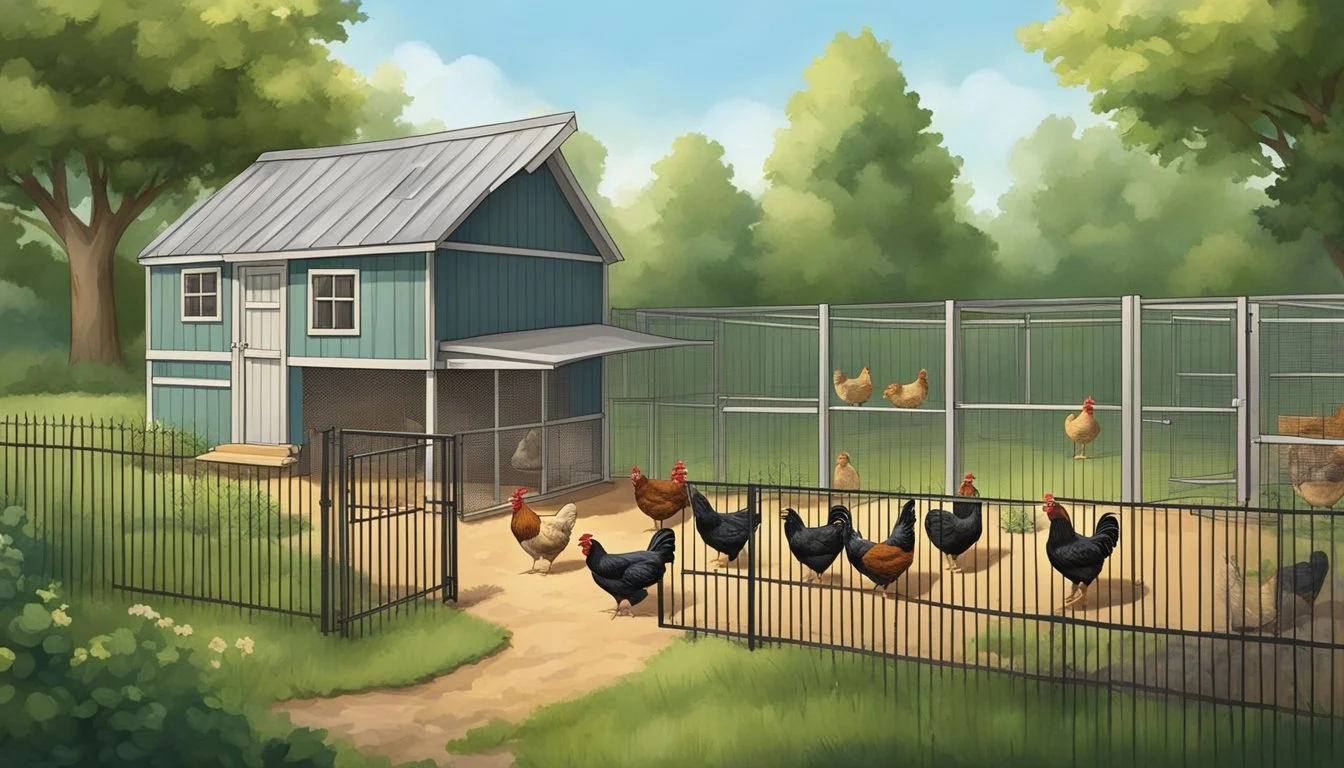Raising Backyard Chickens in Bismarck, ND
A Comprehensive Guide
Raising backyard chickens has become an interest for many residents in urban areas seeking a more sustainable lifestyle or merely the pleasure of fresh eggs. In Bismarck, North Dakota, the practice is subject to strict regulation, rooted in concerns regarding noise, odor, and general public health. The city's stance is clear: no chickens are allowed within city limits unless the property is zoned as an agricultural area. This regulation ensures that the residential character of neighborhoods is preserved, while still allowing for agricultural practices in designated parts of the city.
Understanding local ordinances is crucial for any Bismarck resident considering raising backyard chickens. While the city does not currently permit the keeping of chickens in non-agricultural zones, there is always room for legislative change as community interests evolve. It's important to stay informed about the most current rules by contacting city officials.
For those living in areas of North Dakota where chickens are permitted, keeping backyard chickens requires adherence to health regulations, coop cleaning, and pest control measures to maintain a healthy environment for both the poultry and the community at large. Nuisance laws are also in place to resolve any issues arising from chickens becoming a disturbance to neighbors. Thus, aspiring poultry keepers should not only be aware of their city's standing on the matter but also of the necessary steps to ensure their chickens are raised in a manner that is considerate of their surrounding community.
Understanding Local Chicken Ordinances
Before considering raising backyard chickens in Bismarck, ND, residents must navigate the local ordinances carefully. These laws govern the keeping of chickens and ensuring compliance is crucial for any aspiring backyard farmer.
City Commission and Planning Zoning Regulations
The City Commission alongside the Planning and Zoning Commission regulate the keeping of animals within city limits. They ensure that any animal husbandry practices align with the community's health, safety, and zoning concerns. It is essential for Bismarck residents to consult these commissions for any updates on the regulations before starting a backyard flock.
Specific Provisions Within Bismarck City Limits
Within Bismarck city limits, the ordinances clearly state that the raising of fowl is prohibited unless the property is zoned agricultural. Residents must understand:
Zoning: Keeping chickens is restricted to agricultural zones.
Permits: There is no permit application process for non-agriculturally zoned areas, as chickens are not permitted.
Restrictions: Chapter 3-01-02 lays out the conditions under which the keeping and raising of animals and fowl are allowed.
The fine details, including coop specifications and property size requirements, are subject to inspection and must comply with the city's code of ordinances.
Consequences of Non-Compliance
Failure to adhere to the Bismarck chicken ordinance can lead to consequences including, but not limited to:
Inspection: Properties may be inspected for violations of the chicken ordinance.
Fines: Bismarck residents can face financial penalties for non-compliance.
It is crucial to remain informed of the latest ordinances passed, which can be found on the official Bismarck city website under the relevant ordinance sections for the current year.
Selecting Suitable Chicken Breeds
When choosing chicken breeds for a backyard setup in Bismarck, ND, one should consider egg production capabilities, climate suitability, and the specific care requirements of each breed.
Egg-Laying vs. Dual-Purpose Breeds
Egg-laying breeds, such as the Lohmann Brown, are celebrated for their impressive productivity, often exceeding 300 eggs per year. In contrast, dual-purpose breeds like Australorps are valued for their versatility, providing both substantial egg output and suitable meat yield, making them a practical choice for backyard chicken enthusiasts.
Cold-Weather Breeds Ideal for North Dakota
North Dakota's climate demands breeds that can withstand colder temperatures. It is essential to select breeds with a proven track record of cold weather tolerance. Breeds such as the Sussex and Araucana flourish in colder climates, thanks to their robust nature and resilience to frostbite. The Cochin, with its dense plumage, serves as an excellent example of a breed suited for Bismarck's harsh winters.
Understanding Breed-Specific Needs
Each chicken breed has its own set of needs ranging from specific dietary requirements to space and shelter preferences. For instance, breeds accustomed to warmer climates may require additional provisions in North Dakota's cooler weather. It is crucial for anyone raising chickens in Bismarck to provide adequate shelter and maintain regular coop cleaning to ensure a healthy living environment for their flock.
Setting Up Your Chicken Coop
Before chickens arrive, the coop must offer safety, shelter, and space. It is essential to design a secure enclosure, ensure protection from predators and harsh weather, and provide ample room for habitation and nesting.
Designing a Secure Enclosure
A secure enclosure is paramount. Chicken coops must have solid walls and a lockable door, preventing any openings larger than one inch to deter entry from small animals. The use of heavy-gauge hardware cloth rather than chicken wire increases security, as it resists chewing and invasion from determined predators.
Protection from Predators and Weather
Chickens require a coop that offers shelter from predators and severe weather alike. Roofs must be watertight, and overhangs are advisable to prevent water from entering the coop. Security measures include burying fences at least 12 inches underground to fend off digging predators and ensuring elevated coops prevent access from below.
Providing Adequate Space and Nesting Boxes
Each chicken needs at least 3-4 square feet of coop space, and an ideal design includes one nesting box for every three chickens. Nesting boxes should be filled with suitable bedding material such as straw or wood shavings, placed in a quiet corner of the coop to encourage egg laying. Proper ventilation is essential to circulate air and remove dampness and odors, contributing to the overall health of the flock.
Caring for Chicks to Adults
Proper care during the early stages of a chicken’s life is crucial for their development into healthy adults. The journey from vulnerable chicks to robust hens and roosters requires diligent attention to nutrition, shelter, and health.
Brood Care and Starter Feed
When chicks first hatch, they require a warm and safe brooder environment. The brooder temperature should start at 95 degrees Fahrenheit and be decreased by 5 degrees each week until they are ready to move outside. Starter feed is essential during this period, offering the high protein content (usually about 18-20%) necessary for the chicks to grow strong and healthy.
Transitioning Chicks to Outdoor Living
As the chicks grow into pullets, they become ready to transition to outdoor living. This change should occur once they are fully feathered and temperatures outside the brooder match their acclimatization level. It's crucial to ensure the coop provides protection from predators and adequate space, which, in Bismarck, equates to a minimum of four square feet per chicken, to prevent stress and promote good health.
Maintaining Adult Chicken Health
Once chickens reach adulthood, maintaining their health involves regular checks for parasites, consistent access to fresh water, and a balanced layer feed containing 16-18% protein and essential calcium for strong eggshells. Regular coop cleaning and waste management are essential to prevent disease and pests. Adult hens also need space to exhibit natural behaviors such as dust bathing and foraging.
Daily Management and Best Practices
To raise backyard chickens successfully in Bismarck, ND, it is critical to focus on daily management and best practices. This entails a commitment to good nutrition, regular coop maintenance, and vigilant health monitoring to ensure the well-being of the chickens.
Feeding and Nutrition
Chickens require a balanced diet to maintain their health and egg production. It is important to provide them with a high-quality commercial chicken feed that meets their nutritional needs.
Starter Feed: For chicks, a starter feed with 18-20% protein is recommended.
Layer Feed: Adult hens benefit from layer feed containing 16% protein and calcium for strong eggshells.
Grit: Supply grit to aid in digestion, as chickens do not have teeth to grind their food.
Treats and Leftovers: These should be given sparingly and should not exceed 10% of the chicken's diet to avoid nutritional imbalances.
Cleaning and Coop Maintenance
Cleanliness is paramount to prevent the spread of disease and pests.
Daily: Remove droppings and refresh water containers.
Weekly: Change the bedding material and check for pests such as mites.
Monthly: Conduct a thorough coop cleaning with disinfectants approved for use around poultry.
Good coop design facilitates cleaning, with a minimum of four square feet per chicken to prevent overcrowding and ensure comfort.
Monitoring for Health and Behavior Issues
Vigilant observation of the chickens can identify health and behavior issues early on.
Daily Observation: Watch for abnormal behavior such as changes in eating habits, lethargy, or aggression.
Isolation of Sick Chickens: Quick action is needed to separate and treat any chicken showing signs of illness.
Consultation with Veterinarians: Expert advice may be necessary for persistent health issues.
Regular health checks contribute to early detection of potential problems and ensure prompt treatment.
Community Engagement and Education
Residents of Bismarck, ND have the opportunity to engage in sustainable living practices through raising backyard chickens, which can enhance community involvement and provide practical educational experiences. The following subsections detail the benefits, how to mitigate common concerns, and ways of collaborating with local resources to ensure responsible chicken keeping.
Benefits of Raising Chickens
Raising chickens in Bismarck serves as an excellent educational tool for residents of all ages, offering hands-on learning about animal care, sustainable food sources, and responsible environmental stewardship. Bismarck community members find that chicken-keeping can lead to a stronger sense of connection to food production, encouraging a lifestyle that values fresh, locally-produced eggs.
Addressing Concerns: Noise and Smell
Bismarck residents considering chicken keeping must be mindful of possible concerns relating to noise and smell, factors that could impact public health and neighborhood harmony. To mitigate these issues:
Noise: Only hens are allowed, as they are generally quieter than roosters.
Smell: Proper coop maintenance and waste management practices must be in place to minimize odors.
Collaborating with Extension Services
Collaboration with the North Dakota State University (NDSU) Extension is instrumental in providing Bismarck's aspiring and current chicken keepers with essential resources and guidance. NDSU Extension offers workshops, educational materials, and personalized advice to help ensure that both chickens and residents thrive in a healthy and accommodating urban agricultural setting.
Local Resources and Support
For new and experienced chicken owners in Bismarck, ND, a variety of local resources and support are available. They provide essential supplies, connect like-minded poultry enthusiasts, and offer platforms for sharing tips on raising chickens for fresh eggs or as pets.
List of Supplies and Vendors
In Bismarck and the surrounding Mandan area, there are several businesses where one can purchase supplies for backyard chickens. They offer a range of products from feed to coops.
Bismarck Feed Store: Provides high-quality feed, bedding, and health supplements.
Mandan Coop Construction: Offers customized chicken coop designs that comply with local ordinances.
State Ag Supply: A reliable source for feeders, waterers, and general poultry supplies.
Joining Local Poultry Clubs
Joining a local poultry club gives owners the chance to learn and share experiences. These clubs often hold meetings and provide resources about the care and breeding of chickens.
Bismarck Poultry Enthusiasts Group: A community for sharing knowledge about raising chickens responsibly.
Mandan Avian Society: They offer periodic workshops covering a variety of chicken-related topics.
Connecting with Local Chicken Enthusiasts
Networking with local chicken enthusiasts is made easier by several community platforms. These individuals often exchange advice on the best practices for raising chickens and producing fresh eggs.
Bismarck Backyard Chickens Forum: An online community to ask questions and receive advice.
Mandan Chicken Keepers Meetups: Regular meetups provide an opportunity to connect and learn from each other.







